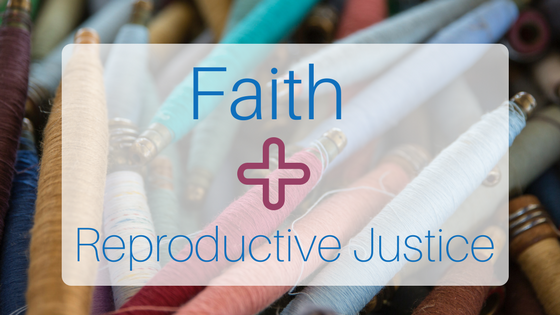
Last week I participated in a panel discussion hosted by the Center for American Progress (CAP) on the intersections of faith and reproductive justice. These conversations are critically important, particularly in these political times when threats to our bodily autonomy and right of conscience are sanctioned by our current administration, Congress, and many state legislatures.
The framing of these public discussions is always interesting and somewhat troubling to me. Often progressive spaces like these do recognize that many people of faith support reproductive health care, but with that understanding is the assumption that supporting the full spectrum of reproductive healthcare, including access to safe abortion care, necessitates some kind of moral reckoning for religious people.
We do ourselves a disservice when we assume the presence of scriptural or ethical conflicts that must be overcome for people of faith to participate in and at times take the lead in organizing efforts to end reproductive oppression. The truth of the matter is that there have always been religious people working to secure reproductive rights—and in their absence, ensuring that women have access to compassionate, life-saving care.
In the years prior to the Roe v. Wade decision clergy were often the ones connecting women with crisis pregnancies with reputable abortion providers in their networks. The Clergy Consultation Service helped hundreds of thousands of women who otherwise would’ve suffered from self-induced or otherwise unsafe procedures, resulting in injury if not death for many. These faith leaders were answering a basic and simple call–to care for the people in their community–even if it put their livelihoods and lives at risk.
When abortion became legal in the United States, the clergy who formed these networks of care created a coalition called the Religious Coalition for Abortion Rights (RCAR). They only intended to maintain that body for a period of time until they felt certain that reproductive rights were firmly secured. That moment of assurance, however, never arrived.
As the current board chair of the Religious Coalition for Reproductive Choice, the “grandchild” of the Clergy Consultation Service, I have witnessed the raging war against reproductive health and rights that so many attempt to couch in a distorted theology of women’s moral inferiority. This political battle has a single mission: to sustain the historically patriarchal, heteronormative, white supremacist culture of the United States that oppresses women, people of color, poor people, and those who do not identify as Christian. We have allowed them to claim the false titles “religious right” and “pro-life” when we know they are neither.
For far too long progressives have conceded the role of faith in public life to those who work against the values of compassion, love, human dignity, and justice. But, I see that changing. I see a resurging commitment among people of faith to answer the call to lift their voices in the public square against these oppressive policies. I see more of us willing to live into the legacy of the Clergy Consultation Service, putting ourselves on the line for the work of social change for women and their families.
The final question of the panel at CAP was what faith leaders can do to work on these issues. My answer was simple: find an entry point. Discover the issue that resonates in your community, whether that’s the rising rates of maternal mortality among women of color or the shackling of women who are in prison during labor. Then tie that issue to larger systemic oppression: racism, healthcare inequity, mass incarceration, etc. Soon you’ll discover that issues of reproductive health, rights, and justice aren’t “hot button” topics to avoid for fear of conflict, but that they are deeply connected to our collective liberation.
If you are in need of some inspiration, take a moment to read about the brave women and men of the Clergy Consultation Service. We stand on their shoulders as we live into our shared calling to work for justice.
 Katey Zeh, M.Div is a strategist, writer, and educator who inspires communities to create a more just, compassionate world. She has written for outlets including Huffington Post, Sojourners, Religion Dispatches, Response magazine, the Good Mother Project, the Journal for Feminist Studies in Religion, and the United Methodist News Service. Her book Women Rise Up will be published by the FAR Press in March of 2018. Find her on Twitter at @kateyzeh or on her website kateyzeh.com.
Katey Zeh, M.Div is a strategist, writer, and educator who inspires communities to create a more just, compassionate world. She has written for outlets including Huffington Post, Sojourners, Religion Dispatches, Response magazine, the Good Mother Project, the Journal for Feminist Studies in Religion, and the United Methodist News Service. Her book Women Rise Up will be published by the FAR Press in March of 2018. Find her on Twitter at @kateyzeh or on her website kateyzeh.com.


It bears stating again: “If men could get pregnant, abortion would be a sacrament.” The first person I heard say this was RC and NOW activist Betty Farians, at the 1971 AAR.
By which I mean to say that abortion should not be viewed as a “bad thing” that sometimes has to happen. It needs to honored as a decision a woman makes about her body and her life.
LikeLiked by 1 person
Yes! Honoring the reproductive decisions of women is essential to our liberation.
LikeLike
Thank you for this post, Katey. You put things into perspective when you write, “…issues of reproductive health, rights, and justice aren’t “hot button” topics to avoid for fear of conflict, but…they are deeply connected to our collective liberation.” Not an easy concept to get hold of in a polarized society.
LikeLiked by 1 person
Thanks, Esther. At the root of the opposition to reproductive health is patriarchy linked with white supremacy. We must continue to dismantle these oppressive systems!
LikeLike
As always, Katey, your writing is so spot-on. Women must have control over their reproductive healthcare choices. Women are moral agents. I trust women.
LikeLiked by 1 person
Thanks for this encouragement, Ann, and for your lifetime of work advocating for women!
LikeLike
Thanks, Katey for reminding us of the need to speak up in public and continue the fight for reproductive justice. RCRC has helped progressives get active wherever we are. Your leadership and your advocacy helps that to happen throughout the country!
LikeLiked by 1 person